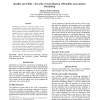Free Online Productivity Tools
i2Speak
i2Symbol
i2OCR
iTex2Img
iWeb2Print
iWeb2Shot
i2Type
iPdf2Split
iPdf2Merge
i2Bopomofo
i2Arabic
i2Style
i2Image
i2PDF
iLatex2Rtf
Sci2ools
117
click to vote
AIPS
2003
2003
Quality and Utility - Towards a Generalization of Deadline and Anytime Scheduling
Scheduling algorithms for real-time systems can be characterized in various ways, one of the most important ones of which is the underlying task model. Many concepts of real-time scheduling relate to either properties local to a single task or constraints imposed onto a task by its context within an application. In terms of real-time applications, task-local properties usually refer to a task-local timeline, whereas contextimposed constraints can frequently be expressed by a clock global throughout the real-time application. This work introduces a paradigm which allows to separate the two aspects of time inherent in an application. Problems under this paradigm are specified in a hierarchical task model. Finally, a suggestion for a dynamic scheduling algorithm based on this specification methodology is made to demonstrate its feasibility.
Related Content
| Added | 31 Oct 2010 |
| Updated | 31 Oct 2010 |
| Type | Conference |
| Year | 2003 |
| Where | AIPS |
| Authors | Thomas Schwarzfischer |
Comments (0)

